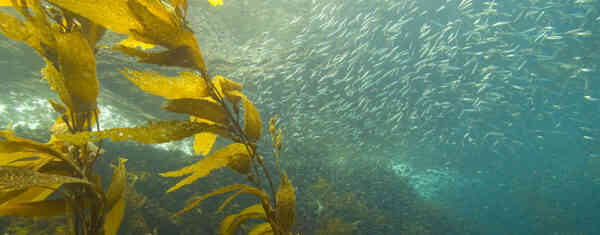Amazing in its diversity, algae have practically not changed over millions of years of evolution, and today they are still are the simplest organisms, perfectly, however, adapted to survive in a variety of conditions. In addition, many types of algae are very tasty and healthy.
Interesting facts about algae
- Algae have neither tissues, nor organs, nor integuments protecting them.
- In the reservoirs of the Earth, one can find algae no larger than a micron in size, and giant algae up to fifty meters long.
- Lichens are the result of the interaction of algae and fungi (interesting facts about fungi).
- In the mid-1980s, large algae were discovered 268 meters below the water column – a record achievement for organisms capable of photosynthesis.
- Brown algae sometimes form real forest thickets under the water column.
- At the moment, scientists know about 100 thousand species of algae.
- About 80% of all natural compounds that occur on Earth appear due to algae and other aquatic vegetation.
- All the inhabitants of the waters feed on algae in one way or another – they either eat them themselves, or prey on creatures with a diet of algae.
- Many rocks arose in the distant past thanks to algae. Moreover, according to the remains of these plants in the thickness of the stone, it is possible to determine their age.
- People eat many types of algae, feed livestock with them, and fertilize the land. In particular, seaweed is an integral part of the Asian sushi dish.
- Eatable seaweed is an extremely healthy product with a high content of minerals, especially iodine.
- Algae is used to clean sewage, as they are an excellent substitute for chemical compounds of a similar purpose.
- Algae-derived agar-agar is a natural substitute for gelatin.
- Without algae, some types of therapeutic mud would not exist.
- From some types of algae, you can make flour saturated with useful trace elements.
- People widely use algae to obtain cellulose, potassium salts, alcohol, iodine and acetic acid from them.
- Many experimental biofuels designed to replace gasoline and diesel are made from algae.
- Scientists conduct experiments on algae and study their structure in order to understand the mechanism of photosynthesis.
- Algae are used to test new chemical samples, as well as samples of natural and dirty water.
- In the future, algae may become the basis of the life support system of spacecraft going to other planets (interesting facts about the planets).
- Thickets of large algae create a unique habitat for many organisms that would otherwise not be able to exist.
- Brown algae and their components in the near future may become the basis for new drugs for dangerous diseases.
- The inventor of monosodium glutamate, a world-famous flavor enhancer, was helped by algae – he made his discovery by examining a substance in kombu algae that made food tastier.
- To obtain the daily norm of iodine, it is enough for a person to eat 30-40 grams of kelp, or “seaweed”.
